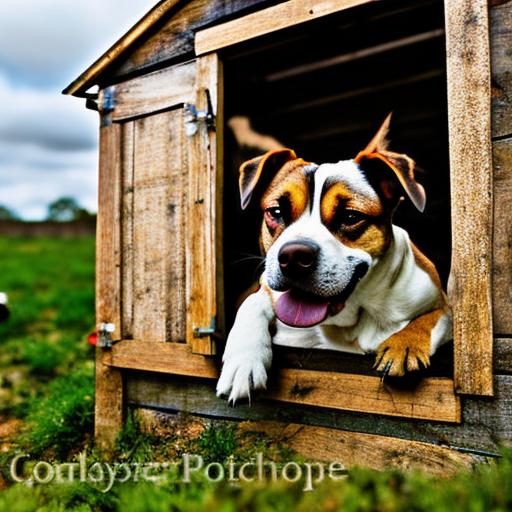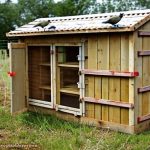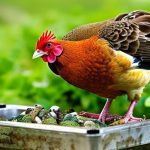Keeping chickens in a dog kennel may seem like an unconventional idea, but it is actually a practical and cost-effective option for backyard chicken keeping. A dog kennel can easily be repurposed into a chicken coop, providing a safe and secure environment for your feathered friends. In this article, we will explore the benefits of keeping chickens in a dog kennel, as well as the steps involved in converting a dog kennel into a chicken coop.
Key Takeaways
- Keeping chickens in a dog kennel can be a viable option for backyard chicken enthusiasts.
- Benefits of keeping chickens in a dog kennel include protection from predators and easy access to food and water.
- Preparing a dog kennel for chickens involves cleaning and disinfecting the space and adding nesting boxes and perches.
- Choosing the right breeds of chickens for a dog kennel involves selecting breeds that are docile and can tolerate confinement.
- Feeding and watering chickens in a dog kennel requires providing fresh water and a balanced diet, including grit and calcium supplements.
Benefits of Keeping Chickens in a Dog Kennel
There are several advantages to using a dog kennel as a chicken coop. Firstly, dog kennels are typically made of sturdy materials such as metal or wood, which provide excellent protection against predators. This means that your chickens will be safe from potential threats such as foxes, raccoons, and stray dogs. Additionally, dog kennels often have secure latches and locks, ensuring that your chickens cannot escape or be stolen.
Another benefit of repurposing a dog kennel for chickens is the cost-effectiveness of this practice. Dog kennels can often be found at affordable prices, especially if you are willing to purchase a used one. By repurposing a dog kennel instead of building a traditional chicken coop from scratch, you can save both time and money. This makes keeping chickens in a dog kennel an attractive option for those on a budget or those who are new to chicken keeping.
Preparing the Dog Kennel for Chickens
Converting a dog kennel into a chicken coop is relatively straightforward. The first step is to thoroughly clean the kennel to remove any dirt or debris. Next, you will need to make any necessary modifications to ensure that the kennel is suitable for chickens. This may include adding roosting bars, nesting boxes, and ventilation openings.
In terms of materials, you will need to provide bedding for the floor of the kennel. Straw or wood shavings are popular choices, as they provide a comfortable and absorbent surface for the chickens. You will also need to install a feeder and waterer inside the kennel, as well as provide access to fresh food and water on a daily basis.
Choosing the Right Breeds of Chickens for a Dog Kennel
When selecting chicken breeds for a dog kennel, it is important to choose breeds that are well-suited to this type of coop. Some chicken breeds are more adaptable and can thrive in smaller spaces, making them ideal for a dog kennel. Bantam breeds, such as Silkies or Polish, are known for their smaller size and docile nature, making them a good choice for a dog kennel.
It is also important to consider the climate in your area when choosing chicken breeds. Some breeds are better suited to colder climates, while others are more heat-tolerant. By selecting breeds that are well-suited to your climate, you can ensure that your chickens will be comfortable and healthy in their dog kennel.
Feeding and Watering Chickens in a Dog Kennel
Feeding and watering chickens in a dog kennel is relatively straightforward. You will need to provide your chickens with a balanced diet that includes a combination of commercial chicken feed and fresh fruits and vegetables. It is important to ensure that your chickens have access to fresh food at all times, as well as clean water.
There are several types of feeders and waterers that are suitable for use in a dog kennel. Hanging feeders and waterers can be attached to the walls of the kennel, keeping them off the ground and reducing the risk of contamination. Automatic feeders and waterers can also be used, which can help to reduce the amount of time you spend on daily chicken care.
Maintaining Cleanliness in the Dog Kennel for Chickens

Maintaining a clean and hygienic environment is essential for the health and well-being of your chickens. Regular cleaning and disinfecting of the dog kennel is necessary to prevent the buildup of bacteria and parasites. This can be done by removing any soiled bedding, sweeping or hosing down the floor, and disinfecting surfaces with a poultry-safe cleaner.
It is also important to regularly check for signs of pests or disease in the dog kennel. This includes checking for mites or lice on the chickens, as well as inspecting the kennel for any signs of damage or weakness. By maintaining cleanliness in the dog kennel, you can help to prevent potential health issues and ensure that your chickens remain happy and healthy.
Providing Adequate Shelter and Protection for Chickens in a Dog Kennel
Providing adequate shelter and protection is crucial for the well-being of your chickens. In a dog kennel, this can be achieved by ensuring that the kennel is secure and predator-proof. This may involve reinforcing any weak spots in the kennel, such as gaps or holes, and adding additional locks or latches to prevent predators from gaining access.
It is also important to provide your chickens with a comfortable and safe place to roost. This can be done by installing roosting bars inside the kennel, which should be positioned higher than the nesting boxes. The roosting bars should be wide enough for the chickens to comfortably perch on, with enough space for each chicken to have its own spot.
Ensuring Proper Ventilation and Lighting in a Dog Kennel for Chickens
Proper ventilation and lighting are essential for the health and well-being of your chickens. In a dog kennel, this can be achieved by adding ventilation openings or windows to allow fresh air to circulate. It is important to ensure that the kennel is well-ventilated, as poor air quality can lead to respiratory issues in chickens.
In terms of lighting, chickens require a certain amount of natural light to maintain their health and productivity. If the dog kennel does not have windows or access to natural light, you may need to install artificial lighting. This can be done by using a combination of fluorescent or LED lights, which should be set on a timer to mimic natural daylight hours.
Dealing with Potential Health Issues for Chickens in a Dog Kennel
Chickens in a dog kennel may be susceptible to certain health issues, so it is important to be proactive in preventing and treating these issues. Common health issues that chickens may face include parasites, respiratory infections, and nutritional deficiencies. Regular health checks and preventative measures can help to minimize the risk of these issues.
To prevent parasites, it is important to regularly check your chickens for signs of mites or lice. This includes inspecting their feathers and skin for any signs of irritation or infestation. If necessary, you can treat your chickens with poultry-safe products to eliminate parasites.
To prevent respiratory infections, it is important to maintain good ventilation in the dog kennel and keep the environment clean. Avoid overcrowding the kennel, as this can increase the risk of disease transmission. Additionally, providing a balanced diet and access to fresh water can help to prevent nutritional deficiencies and promote overall health.
The Viability of Keeping Chickens in a Dog Kennel
In conclusion, keeping chickens in a dog kennel is a practical and cost-effective option for backyard chicken keeping. By repurposing a dog kennel into a chicken coop, you can provide a safe and secure environment for your feathered friends. With proper preparation and care, chickens can thrive in a dog kennel and provide you with fresh eggs and entertainment for years to come. So, if you are considering keeping chickens, don’t overlook the possibility of using a dog kennel as a coop.
If you’re considering keeping chickens in a dog kennel, you may also be interested in learning more about creating a suitable chicken coop. Poultry Wizard offers a helpful article on building a chicken coop in Chester, SC, which provides valuable insights and tips for creating a safe and comfortable environment for your feathered friends. Check out the article here to discover the essential elements of a well-designed chicken coop.
FAQs
What is a dog kennel?
A dog kennel is a small enclosure or shelter where dogs are kept for various reasons, such as training, transportation, or temporary housing.
Can you keep chickens in a dog kennel?
Yes, you can keep chickens in a dog kennel, but it is not recommended as a permanent solution. Chickens require more space and ventilation than a typical dog kennel can provide.
What are the disadvantages of keeping chickens in a dog kennel?
The disadvantages of keeping chickens in a dog kennel include limited space, poor ventilation, and potential health risks. Chickens need room to move around, stretch their wings, and access fresh air. A dog kennel may not provide enough space or ventilation for chickens to thrive.
What are the alternatives to keeping chickens in a dog kennel?
The alternatives to keeping chickens in a dog kennel include building a chicken coop or purchasing a pre-made one. A chicken coop provides more space, ventilation, and protection from predators than a dog kennel. Additionally, a chicken coop can be customized to meet the specific needs of your flock.
What are the benefits of keeping chickens?
The benefits of keeping chickens include a fresh supply of eggs, natural pest control, and fertilizer for your garden. Chickens are also entertaining and can be great pets for children and adults alike.
Meet Walter, the feathered-friend fanatic of Florida! Nestled in the sunshine state, Walter struts through life with his feathered companions, clucking his way to happiness. With a coop that’s fancier than a five-star hotel, he’s the Don Juan of the chicken world. When he’s not teaching his hens to do the cha-cha, you’ll find him in a heated debate with his prized rooster, Sir Clucks-a-Lot. Walter’s poultry passion is no yolk; he’s the sunny-side-up guy you never knew you needed in your flock of friends!







